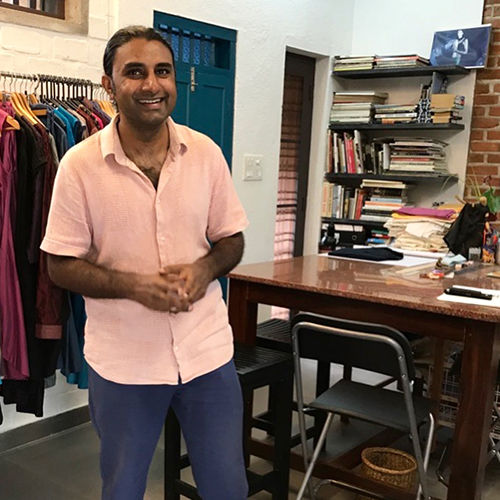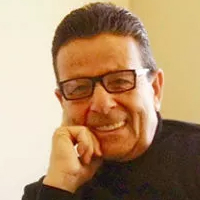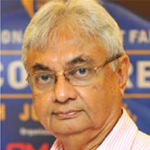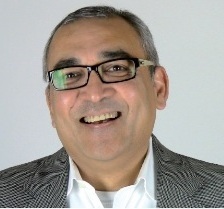
Joe Ikareth
Founder
Joe Ikareth
A Different Movement
Joe Ikareth has a rock-solid fashion and textiles background, which he has used to create not only unconventional fashion-clothing but also apparel for the differently-abled. An ace at garment construction, it is this knowledge that has made him an expert in not only creating costumes for stage productions, but also apparel that people with physical disabilities would be confident to wear. Ikareth outlines his journey in an interview with Meher Castelino
Fibre2Fashion: Please give us a brief background about yourself.
Joe Ikareth:
Coming to Kerala for my plus-two level from a regular school in Kuwait, what struck me back home was the architecture of Corpus Christi (High School), built by architect Laurie Baker for pioneering educationist Mary Roy. It was not boring or repetitive-it created a sensory space, which opened my mind to design. Much later, I graduated in 1996 from the National Institute of Fashion Technology (NIFT), New Delhi with the Best Design Collection for my 'Hot Jazz Biscuits' based on the novel "Dr Jekyll and Mr. Hyde". My focus was on patternmaking and menswear. At Suneet Verma, I moved into womenswear and haute couture. I learnt about the wonderful world of embellishments with embroidery, craftsmanship, wedding collections and being responsible for a big team.
F2F: Tell us about the Move Ability collections. How and when did those start? How long does it take to put on your shirt in the morning?
JI:
This is a question that most of us do not think of every day. For an able-bodied person, this could be less than a minute. But for a differently-abled person or a person with reduced mobility, this day-to-day routine can be a seemingly endless struggle. Move Ability Clothing provides clothing solutions for differently-abled people that answer an increasing need for ease of dressing and undressing. The motivation was based on our experience as parents of a 14-year-old daughter Tilotama, who has a partially paralysed right arm, among a host of other disabilities. We have developed clothes that allow her a sense of independence and we would love to spread this sense of self-empowerment among the differently-abled.
F2F: Do these clothes fit into your design sensibilities?
JI:
Move Ability Clothing is an evolution of design principles and ideas, which I continue to develop along with my clothing line Joe Ikareth. The experience of working on clothes for dance companies led me to designing clothes with a strong focus on movement. This has become an integral part of my design for contemporary clothing. We apply the concept to pattern-make ergonomical and personalised designs based on a person's ability for Move Ability Clothing. Empathy in design is an important factor in designing clothes for people with special needs.
F2F: What are the different problems that your collection for Move Ability address? How many collections do you create in a year for Move Ability? What is the price range?
JI:
Till now, we have been working on clothes for people with motor function disabilities. With Move Ability, we offer personal solutions to individual needs. The Joe Ikareth line does 3-4 limited edition collections every year. The price range of Joe Ikareth is ₹2,750-12,000. We undertake personalised designs, which can work up to ₹30,000. The Move Ability Clothing is priced at ₹2,500-5,000.
F2F: How do you market the Move Ability and normal collections?
JI:
It has mostly been word of mouth. For the Joe Ikareth shop in Kochi, we also use social media.
F2F: Did you do any research for the Move Ability clothes?
JI:
Along with my wife Murielle-a creative movement therapist-we created Move Ability which also incorporates her movement therapy. Based on the premise that body, mind and spirit are interconnected, movement therapy is a psychosomatic approach using movement to support intellectual, emotional and motor functions of the body. We have also done a survey research with various institutions to get feedback from differently-abled people, their families and also professionals. It was helpful to understand better specific needs according to different conditions.
F2F: Have you reached out to institutes for people with disabilities?
JI:
Yes, we are in touch with various institutes. At present, we are working on a rehabilitation project with Pallium India in Thiruvananthapuram, Kerala.
F2F: Each disability is different. Do you customise? How do you calculate your design cost?
JI:
Depending on their needs and movement, we customise and adapt the designs. The costs depend on the amount of customisation required on the basic pattern.
F2F: What percentage of the population can you cater to?
JI:
According to the Census of India 2011 (2016 updated) data, the number of disabled people is 26.8 million, or 2.21 per cent of the population. At present we are in talks with big clothing companies to make a mass-produced line that can bring down the cost per piece.
F2F: What steps would you suggest for more people to join this initiative of yours?
JI:
A few years ago, I took part in a competition- Nordic Independent Living Challenge. It was hosted in Denmark for the Scandinavian region. It was a great experience to meet and exchange ideas with a diverse group of people from caretakers of the disabled to tech geeks, university students, designers, differently-abled persons and city council members from the Scandinavian capitals all coming together to work on this theme. In India too, with government and CSR support we can develop new ideas and solutions for differently-abled people by bringing together multi-disciplinary groups.
F2F: Smartwear is revolutionising clothing. How would you like to see technology coming together for the kind of clothing that you design?
JI:
We are at present also using nanotechnology fabric in Move Ability Clothing. Technology and design coming together can bring about new innovations that can help the differently-abled.
F2F: Have you collaborated with other designers?
JI:
I collaborate on projects with other designers, dancers, artists and musicians. I also create performance art collaborations, with multimedia to present my collection in different environments.
F2F: You have designed costumes for dance dramas and plays. Please tell us more.
JI:
Over the past 20 years, I have made costumes mainly for dancers and theatre artistes in India and abroad. I have worked with Brigitte Chataigner, Angela Stoecklin, Navtej Johar, Gilles Chuyen, Atul Kumar, Arjun Raina, among others.
F2F: How easy or difficult is it to create costumes?
JI:
The body in movement has always fascinated me, and I enjoyed dancing as a child. Designing costumes seems to me a natural extension of that. The lines seem to flow whenever I design for performance, imagining movement and style together. After that comes the technical aspect.
F2F: You are an expert with uniforms for hotels too. Please tell us more.
JI:
We extend the same concepts of movement to our uniform designs as well. Uniforms need to be elegant, and yet there should be ease of movement in the workspace. It started with the Taj Group of Hotels in 2003 with the first being Taj Malabar in Kochi, and I later worked on their other properties in Kovalam, Chennai and Maldives. We have also designed uniforms for other corporate groups like Muthoot, Manorama, DM Healthcare, Avitis Hospital, Bipha Ayurveda, Dr Kutty's Initiative, etc.
F2F: What fabrics do you use for uniforms? Are those different from the ones you use for collections?
JI:
Depending on the location of the institute, we have worked with blends of polyester/ viscose, cotton/viscose and cotton/linen. The Joe Ikareth collection works primarily with natural fabrics. For Move Ability, we use natural fabrics as well as blends and nanotechnology fabrics. For the fabrics, we work directly with manufacturers.
F2F: Where do you get your textiles from? How much of Kerala textiles are featured in your collections? How important are weaves, prints, dyes and embellishments in your collection?
JI:
I source my fabrics from all over India. But my classic line is based on the Kerala traditional fabric. Some of the nanotechnology fabrics are from Switzerland. I have been inspired by and working with the creamy coolness of the Kerala fabric for 18 years. This is my Joe Ikareth classic line, which I have all the year round at my shop in Mattancherry, Kochi. Depending on the collection, I use hand-woven jacquards, block prints and various embroidery techniques.
F2F: Do you sell anywhere else in India apart from Kochi? Have you held exhibitions abroad?
JI:
We produce very few pieces in a year; so, the primary focus is the shop. I have sold collections at various points in India at Grasshopper, Amethyst, Ensemble, Mélange, Bombay Electric, Paper Boat Collective, Teatro Dhora. We have done capsule collections for Proud in Fukuoka, Japan; Atelier Sud, Greece; Miss Coco in Bretagne, France; 'Silk Chassis', London; and a plus size collection for The gallery at Cobblestone Walk, Sussex. I have done pop-up exhibitions at various places in France, and also participated in the trade fair Le Showroom at the Paris Fashion Week. Ami Javeri is the first one to offer Move Ability a space to showcase at Creo.
Arun Sirdeshmukh
Rahul Mehta
Abhay Gupta
Bill D’Arienzo
Rahul Mehta
Anurag Batra
Aseem Prakash
Fanny Vermandel
Gabi Seligsohn
Pradip Mehta



_8.JPG)








